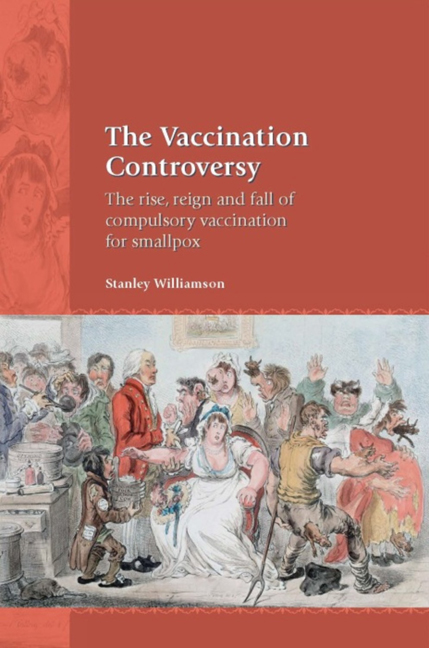Book contents
- Frontmatter
- Dedication
- Epigraph
- Contents
- Acknowledgements
- Part I The Road to Compulsion
- 1 The Byzantine Operation
- 2 The Small Pockes
- 3 The Engrafted Distemper
- 4 The Language of Figures
- 5 The Suttonian System
- 6 The Great Benefactor
- 7 The Speckled Monster
- 8 The Three Bashaws
- 9 A Competent and Energetic Officer
- 10 Formidable Men
- 11 The Present Non-System
- 12 Toties Quoties
- 13 Crotchety People
- Part II The Reign of Compulsion
- Part III The Retreat from Compulsion
- Notes
- Bibliography
- Index
9 - A Competent and Energetic Officer
from Part I - The Road to Compulsion
- Frontmatter
- Dedication
- Epigraph
- Contents
- Acknowledgements
- Part I The Road to Compulsion
- 1 The Byzantine Operation
- 2 The Small Pockes
- 3 The Engrafted Distemper
- 4 The Language of Figures
- 5 The Suttonian System
- 6 The Great Benefactor
- 7 The Speckled Monster
- 8 The Three Bashaws
- 9 A Competent and Energetic Officer
- 10 Formidable Men
- 11 The Present Non-System
- 12 Toties Quoties
- 13 Crotchety People
- Part II The Reign of Compulsion
- Part III The Retreat from Compulsion
- Notes
- Bibliography
- Index
Summary
For many years isolated voices had been hinting, some more discreetly than others, at the need for some kind of state intervention to enforce vaccination of the lower classes, but seldom using the blunt word ‘compulsion’. The fear that inhibited stronger pressure was that enforcement might fail, not on medical but on political grounds. Warning that ‘John Bull is jealous of the liberty of the subject’, the Lancet, ‘on the low ground of expediency, irrespective of right’, called upon hasty legislators to pause. The legislators scarcely needed the warning: in spite of the manifest inadequacy of the Acts of 1840/41 no serious attempt was made for nearly a decade to pass beyond the voluntary principle into the dangerous waters of coercion.
Towards the middle of the century the balance decisively shifted. The medical profession, tired of having its hands tied by indifferent politicians and obstructive civil servants, turned from individual protest to concerted action. In September 1848 an anonymous letter to the Lancet urged the formation of a society for the study of the behaviour of epidemic disease. In July of the following year a public meeting, attended by 200 members of the medical profession and prominent figures from other walks of life, took place in Hanover Square under the presidency of the Earl of Shaftesbury, and the Epidemiological Society of London was inaugurated. The precisely stated objects of the Society were
to institute a rigid examination into the causes and conditions which influence the origin, propagation, mitigation, prevention and treatment of epidemic diseases. It will be a part of the Society's province to ascertain the operation of existing enactments [and to] point out such alternatives as may be necessary for the protection of the public health […] The Society propose to communicate with the Government and the Legislature in matters connected with the prevention of epidemic disease.
Numerous committees were set up to investigate subjects ranging from cholera to ‘disease appertaining to the Vegetable Kingdom’ and ‘the question of supplying the labouring classes with Nurses in Epidemic and other Diseases’, but there can be little doubt that the topic of immediate concern was the province of the ‘Committee on Small-Pox and Vaccination’. The Commemorative Volume of the Society, published to mark its fiftieth anniversary in 1900, describes the efforts of this committee as ‘almost epoch-making’.
- Type
- Chapter
- Information
- The Vaccination ControversyThe Rise, Reign and Fall of Compulsory Vaccination for Smallpox, pp. 120 - 134Publisher: Liverpool University PressPrint publication year: 2007



